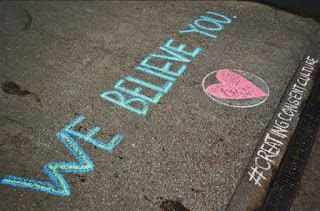One more time for the folks in the back. TW: Sexual assault
There's a saying in social media that many activists use, "one more time for the people in the back." It is written, or spoken through gifs, when a person feels they are saying something very reasonable but having to do so while including an explanation and justification for why this very reasonable thing has be stated yet again. It is an expression of frustration and education, hence the title of this post.
Why am I writing about rape culture, again? Why am I out here examining how rape culture includes more than the violent act of rape but sexual misconduct, harassment, victim blaming, dress code policies and #metoo? I'm doing this for many reason, one is because statistically sexual assault will touch all of us, if not you directly than someone you know. We find ourselves in the era of #metoo, where we are finally starting to believe victims when them come forward. There has been this promise of, if you speak out, not only will we actually believe you but we will deliver justice. The problem is, in a society that is rooted in patriarchy, where women and anyone close to feminine, are labeled as less, we don't have any idea what this justice should look like.
As Louis C K., Aziz Ansari, and Matt Lauer are racing towards their comeback, we are floundering with how to respond. Many of us are still upset that these three names appear side by side, particularly Aziz. After a woman recounted an evening with him, where she was clearly uncomfortable and violated, many are quick to reference the actual definition of rape and how what he did doesn't warrant the R word. That night is also labeled a "bad date, that all women can relate to." The commonality of the woman's experience is made to be a pass rather than a huge signifier. Why are we calling, being forced to get physical with someone for fear of repercussions a "bad date?" A bad date is when the person forgets to pick you up or texts their ex the entire evening, not shoves their fingers down your throat when you stated you don't want to do anything sexual with them on your first date. Yet this is the problem, how can we say a comeback is too soon, when we can't even agree on what warrants the terms victims and predator, assault or date?
To further convolute the issue at hand, is that we tend to forget that sexual misconduct is a matter of degree. We can't compare every perpetrator to Harvey Weinstein or Bill Cosby. Aziz Anasari and Asia Argento are also guilty but we seem to be stuck in the cyclical argument of, "but how guilty?" As a society we have never asked these questions and that is apparent in our laws. Can you call the cops out of discomfort? Yes, white people do it all the the time when people of color are existing but for some reason if you are victim of sexual discomfort, you are supposed to take it because it wasn't as bad as other forms of sexual violence. The patriarchy is alive and well and systemically cribbling nonmarginalized and marginalized group members yet we are trying to operate a progressive feminist movement within its decay instead of rejecting it entirely. There is no blueprint on how to move forward but this much is clear, there is no moving forward if we are still attempting to define what constitutes assault.
Much like racism, sexual misconduct claim's legitimacy rests in the hands of the victims. We have to prove that we were violated and we have to hope that what happened to us is perceived as violent enough, dibilating enough, extreme enough, to warrant the public's understanding before we can even hope for support. Silence is deadly in both cases and it protects the accused not the accuser. Less than 3 percent of sexual assault claims are false yet we still ask, what were you wearing when you were assaulted before anything else. We still speak of comeback tours and redemption. Why are we so concerned with these people's legacy and careers? The short answer, because we are accustomed to. We live in a society where redemption is a privilege that is allotted to those with wealth and/or celebrity. This idea, that they have learned their lesson is so common but real penalties, like fines or jail time are not even in our vitotiol. Public apologies or just stepping off the red carpet for six months is enough for us to say, "well, enough is enough let's go see their stand-up about dating and birth control because clearly they've learned their lesson."
Why am I writing about rape culture, again? Why am I out here examining how rape culture includes more than the violent act of rape but sexual misconduct, harassment, victim blaming, dress code policies and #metoo? I'm doing this for many reason, one is because statistically sexual assault will touch all of us, if not you directly than someone you know. We find ourselves in the era of #metoo, where we are finally starting to believe victims when them come forward. There has been this promise of, if you speak out, not only will we actually believe you but we will deliver justice. The problem is, in a society that is rooted in patriarchy, where women and anyone close to feminine, are labeled as less, we don't have any idea what this justice should look like.
As Louis C K., Aziz Ansari, and Matt Lauer are racing towards their comeback, we are floundering with how to respond. Many of us are still upset that these three names appear side by side, particularly Aziz. After a woman recounted an evening with him, where she was clearly uncomfortable and violated, many are quick to reference the actual definition of rape and how what he did doesn't warrant the R word. That night is also labeled a "bad date, that all women can relate to." The commonality of the woman's experience is made to be a pass rather than a huge signifier. Why are we calling, being forced to get physical with someone for fear of repercussions a "bad date?" A bad date is when the person forgets to pick you up or texts their ex the entire evening, not shoves their fingers down your throat when you stated you don't want to do anything sexual with them on your first date. Yet this is the problem, how can we say a comeback is too soon, when we can't even agree on what warrants the terms victims and predator, assault or date?
To further convolute the issue at hand, is that we tend to forget that sexual misconduct is a matter of degree. We can't compare every perpetrator to Harvey Weinstein or Bill Cosby. Aziz Anasari and Asia Argento are also guilty but we seem to be stuck in the cyclical argument of, "but how guilty?" As a society we have never asked these questions and that is apparent in our laws. Can you call the cops out of discomfort? Yes, white people do it all the the time when people of color are existing but for some reason if you are victim of sexual discomfort, you are supposed to take it because it wasn't as bad as other forms of sexual violence. The patriarchy is alive and well and systemically cribbling nonmarginalized and marginalized group members yet we are trying to operate a progressive feminist movement within its decay instead of rejecting it entirely. There is no blueprint on how to move forward but this much is clear, there is no moving forward if we are still attempting to define what constitutes assault.
Much like racism, sexual misconduct claim's legitimacy rests in the hands of the victims. We have to prove that we were violated and we have to hope that what happened to us is perceived as violent enough, dibilating enough, extreme enough, to warrant the public's understanding before we can even hope for support. Silence is deadly in both cases and it protects the accused not the accuser. Less than 3 percent of sexual assault claims are false yet we still ask, what were you wearing when you were assaulted before anything else. We still speak of comeback tours and redemption. Why are we so concerned with these people's legacy and careers? The short answer, because we are accustomed to. We live in a society where redemption is a privilege that is allotted to those with wealth and/or celebrity. This idea, that they have learned their lesson is so common but real penalties, like fines or jail time are not even in our vitotiol. Public apologies or just stepping off the red carpet for six months is enough for us to say, "well, enough is enough let's go see their stand-up about dating and birth control because clearly they've learned their lesson."


Comments
Post a Comment